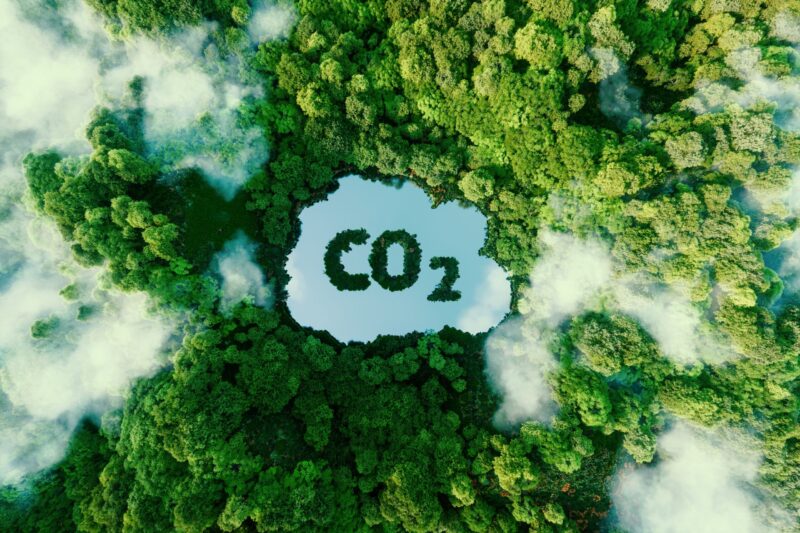
This site
is mobile
responsive

Did you know that in 2019, the world’s greenhouse gas (GHG) emissions hit a record high of 49.76 billion tonnes, putting us on a collision course with a climate disaster? Unfortunately, nature can only absorb a fraction of these emissions, about 19 billion tonnes of CO2 annually, which means that we need to take urgent action to reduce our carbon footprint.
The excessive release of GHGs, particularly CO2, traps heat in the atmosphere and contributes to the rising global temperatures, which have already increased by 1°C. If we continue with business as usual, we could face a catastrophic 2°C temperature rise that could be irreversible, causing widespread damage and loss.
T o address this issue, world leaders have initiated several conventions like the Paris Agreement, Kyoto Protocol, UNFCCC, and Sustainable Development Goals already taken place in Glasgow, UK. COP26 and the upcoming COP27 meetings are aimed at limiting the temperature rise to a safe limit of 1.5°C. Unfortunately, there are no signs of a reduction in GHG emissions, and we seem to be on track towards the 1.5°C – 2.0°C temperature rise.

According to NASA, a 1.5°C temperature rise by 2100 will cause the ice in the Arctic and Antarctic to melt, leading to a sea-level rise between 10 to 30 inches, affecting millions of people worldwide. It will also decrease marine life by 70-90 per cent, crop yields by 3 per cent, and lead to more frequent heatwaves, floods, and other climate-related disasters. These events will threaten food security, cause mass migration, and negatively impact the global economy, as the world population is expected to grow from 8 billion to 9.7 billion by 2050 and 10.4 billion by 2100.
Malaysia has taken serious measures to combat GHG emissions through a pledge to the international community. As part of the National Determined Contribution (NDC) pledge in COP26 and reaffirmed in COP27, the Government has committed to be net-zero emission by 2050 and reduce CO2 intensity against GDP by 45% by 2030. With carbon pricing, Malaysia can steer its economy towards a path of carbon-neutral growth, improving resource efficiency, stimulating investment in clean energy, and lowering emissions.
However, implementing a carbon tax can be challenging in developing countries like Malaysia, as it requires a delicate balance between economic development, environmental protection, social equity, and poverty reduction. One important step is to review and rationalise fossil fuel subsidies, which can help create a more level playing field for sustainable energy sources.

The Emission Trading Scheme (ETS) is a “cap and trade” concept to limit CO2 emissions in a particular sector. It works by providing emission credits to companies that produce fewer emissions than the baseline, which can be traded. Companies that emit more than the baseline need to purchase credits from those with lower emissions. The market price of these credits is determined by supply and demand rather than the government, which encourages companies to prioritise energy efficiency, conservation, renewable energy, and supply chain decarbonisation to reduce emissions.
The carbon market is the third carbon pricing instrument, where carbon credit will be tradable in the exchange. Malaysia recently launched its first Voluntary Carbon Market, a platform where companies can offset their carbon emissions and stay competitive in the global market. This initiative is part of Malaysia’s effort to achieve its 2030 and 2050 carbon reduction targets.
The carbon market offers quality carbon credits generated by projects that are recognised globally, including Nature Based Solution projects that make use of Malaysia’s vast forest cover. According to a study by the National University of Singapore, investable forest carbon in Malaysia can yield a net present value of RM10.8 billion yearly. However, according to McKinsey’s research, Malaysia has only two active carbon projects, accounting for less than one million tonnes of carbon credit issuance. In contrast, Indonesia, Cambodia, and Thailand have much higher levels of activity in this area.
To fully utilise Malaysia’s abundant biomass for renewable energy, biofuel, and biogas, more carbon projects need to be developed, validated and verified. Establishing local carbon services capacity for project development is essential to implement these projects cost-effectively. With the Voluntary Carbon Market in place, Malaysian companies can not only contribute to reducing carbon emissions but also enhance their competitiveness in export markets, particularly the EU.
Many advanced economies have already adopted aggressive emission targets and implemented carbon pricing mechanisms like the carbon tax, ETS, or both. The European Commission has also introduced the carbon Border Adjustment Mechanism (CABM), which will take effect in 2023 to prevent carbon leakage and mitigate carbon emissions beyond the border. This will make products from foreign countries without carbon pricing governance uncompetitive, driving importers to source goods from countries that do have such governance. The CABM currently covers products like cement, iron and steel, aluminium, fertilisers, organic chemicals, plastics, electricity, hydrogen, and ammonia.

Implementing a carbon tax and ETS is crucial for Malaysian producers to remain globally competitive, and the launch of the Voluntary Carbon Market (VCM) by Bursa Malaysia is a step in the right direction. However, there is still a need for ETS and a carbon tax, which are already outlined in “Pelan Kelestarian Alam Sekitar Malaysia 2020 – 2030”. Malaysian manufacturers must prepare for this wave as it benefits both the business and the environment. Failure to do so may cause Malaysian exporters to lose trade worth billions of Ringgit to European countries due to their failure to produce goods with greater GHG efficiency. The Commonwealth Secretariat 2021 report revealed that Malaysia had RM3.38 billion worth of CBAM-related exports to the EU in 2019, with iron and steel, aluminium, fertilisers, and cement being the most significant contributors. As the list of products subject to CBAM expands, the risk to Malaysian exports will increase. According to a study by the University College London, UCL Institute for Sustainable Resources, Malaysia may lose trade worth over RM112 billion to European countries if its exporters fail to produce goods with greater GHG efficiency. Therefore, it is essential for Malaysian manufacturers to adapt to the changing market conditions to remain competitive and sustainable.
The critical industry listed above will be broadly exposed, and measures must be taken on how to mitigate the risk. This does not mean that other sectors will not be affected. Initiatives to reduce carbon must be across the board to ensure the sustainability of the business and stay current with the global trend. Consumers in the modern days prefer green perceive brands as a choice and the way of living. “Climate change”, in mind, will be a significant part of consumer selection as the world moves towards climate uncertainties.
MIDA has recognised the significance of reducing carbon emissions and is providing various incentives under the MIDA ESG initiative to promote economic activities related to decarbonisation, circular economy, energy efficiency and conservation. Countries and companies that adopt carbon pricing and reduce CO2 emissions will have a competitive edge in global trade, which can help them become part of the low-carbon value chain.
MIDA is committed to taking proactive measures to combat climate change, adhering to SDGs, and playing a significant role in supporting the government’s National Determinant Contribution (NDC) to achieve the climate target for Net Zero Emission by 2050.
Malaysia is poised to become a top destination for environmental, social and governance (ESG) investments, with a focus on high-value products, low carbon industry, decarbonisation, circular economy, bioeconomy, and energy transition. As part of the National Investment Aspirations (NIA), ESG is heavily promoted and offers tremendous growth potential for businesses.
Investors and stakeholders alike are increasingly prioritising ESG, and businesses that embrace it can gain a competitive edge. Malaysian SMEs, in particular, should seize this opportunity to become the preferred partner, vendor, or supplier of larger players both locally and abroad. By embracing ESG, we can build a sustainable ecosystem, reduce our carbon footprint, and ensure a prosperous future for all.
For more information, please get in touch with the MIDA Circular Bioeconomy Unit at https://www.mida.gov.my/staffdirectory/circular-bioeconomy-unit/